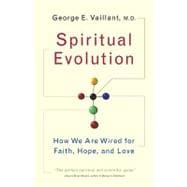
Note: Supplemental materials are not guaranteed with Rental or Used book purchases.
Purchase Benefits
What is included with this book?
George E. Vaillant, M.D., is a psychoanalyst and a research psychiatrist, one of the pioneers in the study of adult development. He is a professor at Harvard University and directed Harvard’s Study of Adult Development for thirty-five years. He is the author of Aging Well and The Natural History of Alcoholism, and his 1977 book, Adaptation to Life, is a classic text in the study of adult development. He lives in Boston; East Thetford, Vermont; and Victoria, Australia.
| Acknowledgments | p. xi |
| Positive Emotions | p. 1 |
| The Prose and the Passion | p. 18 |
| Three Evolutions | p. 40 |
| Faith | p. 65 |
| Love | p. 82 |
| Hope | p. 102 |
| Joy | p. 119 |
| Forgiveness | p. 135 |
| Compassion | p. 151 |
| Awe and Mystical Illumination | p. 164 |
| The Difference Between Religion and Spirituality | p. 185 |
| Notes | p. 207 |
| Permissions | p. 229 |
| Index | p. 231 |
| Table of Contents provided by Ingram. All Rights Reserved. |
The New copy of this book will include any supplemental materials advertised. Please check the title of the book to determine if it should include any access cards, study guides, lab manuals, CDs, etc.
The Used, Rental and eBook copies of this book are not guaranteed to include any supplemental materials. Typically, only the book itself is included. This is true even if the title states it includes any access cards, study guides, lab manuals, CDs, etc.
Excerpted from Spiritual Evolution: How We are Wired for Faith, Hope, and Love by George Vaillant
All rights reserved by the original copyright owners. Excerpts are provided for display purposes only and may not be reproduced, reprinted or distributed without the written permission of the publisher.